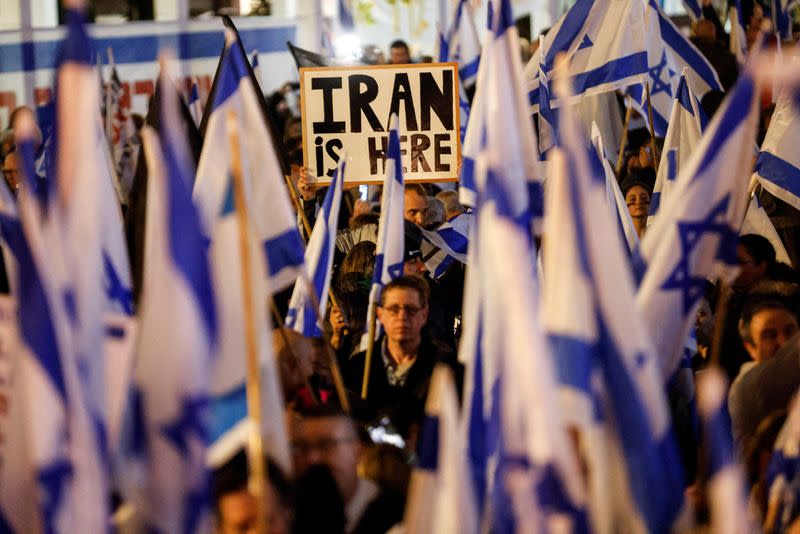Israelis rally in three cities against Netanyahu legal reforms
Dan Williams
Sat, January 14, 2023, 1:32 PM CST
TEL AVIV (Reuters) -Tens of thousands of Israelis demonstrated in three major cities on Saturday against Prime Minister Benjamin Netanyahu’s judicial reform plans, with organisers accusing him of undermining democratic rule weeks after his reelection.
Bestriding a religious-nationalist coalition with a solid parliamentary majority, Netanyahu, now in his sixth term, wants to rein in the Supreme Court in what he has described as a restoration of the balance of the three branches of government.

Critics say the proposed reforms would cripple judicial independence, foster corruption, set back minority rights and deprive Israel’s courts system of credibility that helps fend off war-crimes allegations abroad. Among those opposed are the Supreme Court chief justice and the country’s attorney-general.
After President Isaac Herzog appealed to polarised politicians to “lower the temperatures” of the debates, organisers of the demonstrations – held under chilly winter rain – sought to strike a note of national unity.
“Take an Israeli flag in one hand, an umbrella in the other, and come out to protect democracy and law in the State of Israel,” said centrist ex-defence minister Benny Gantz, who attended the Tel Aviv rally but, like other opposition figures, was not due to address it.
“We Are Preserving Our Shared Home,” read one demonstrator’s placard. Netanyahu was guilty of a “legal putsch”, said another.
Israeli media put the number in attendance at some 80,000, with thousands more at protests in Jerusalem and Haifa.
Social media footage showed a small number of Palestinian flags on display, in defiance of Netanyahu’s far-right allies. One of these, National Security Ministry Itamar Ben-Gvir, told Kan TV he wanted such flags removed but was awaiting the opinion of the attorney-general before ordering any crackdown by police.
The 73-year-old Netanyahu on Friday signalled flexibility on the reform plan, saying it would be implemented “with careful consideration while hearing all of the positions”.
Polls have diverged on public views of the reforms. Channel 13 TV last week found 53% of Israelis were opposed to changing the court appointments’ structure while 35% were in support. But Channel 14 TV on Thursday found 61% in favour and 35% opposed.
Critics of the Supreme Court say it is overreaching and unrepresentative of the electorate. Its proponents call the court a means of bringing equilibrium to a fractious society.
“Tens of thousands of people were at tonight’s demonstrations. In the election held here two and a half months ago, millions turned out,” tweeted Miki Zohar a senior lawmaker in Netanyahu’s conservative Likud party.
“We promised the people change, we promised governance, we promised reforms – and we will make good on that.”



 Alkis Konstantinidis / Reuters
Alkis Konstantinidis / Reuters
 Bulgarian pro-Russia presidential candidate, Rumen Radev (Photo by AFP)
Bulgarian pro-Russia presidential candidate, Rumen Radev (Photo by AFP)


 This tiny Russian plane has a ridiculous number of weapons
This tiny Russian plane has a ridiculous number of weapons
 FOTO design by Farwa Rizwan/ Al Arabiya News
FOTO design by Farwa Rizwan/ Al Arabiya News
 People wearing orange ribbons of St. George, a symbol widely associated with pro-Russian protests in Ukraine attend an “Anti-Maidan” rally to protest against the 2014 Kiev uprising, which ousted President Viktor Yanukovich, in Moscow February 21, 2015 (Reuters / Sergey Karpukhin)
People wearing orange ribbons of St. George, a symbol widely associated with pro-Russian protests in Ukraine attend an “Anti-Maidan” rally to protest against the 2014 Kiev uprising, which ousted President Viktor Yanukovich, in Moscow February 21, 2015 (Reuters / Sergey Karpukhin)




 Sorry, Wrong Flag: Swiss President Greeted with Denmark flag in Ukraine.
Sorry, Wrong Flag: Swiss President Greeted with Denmark flag in Ukraine.